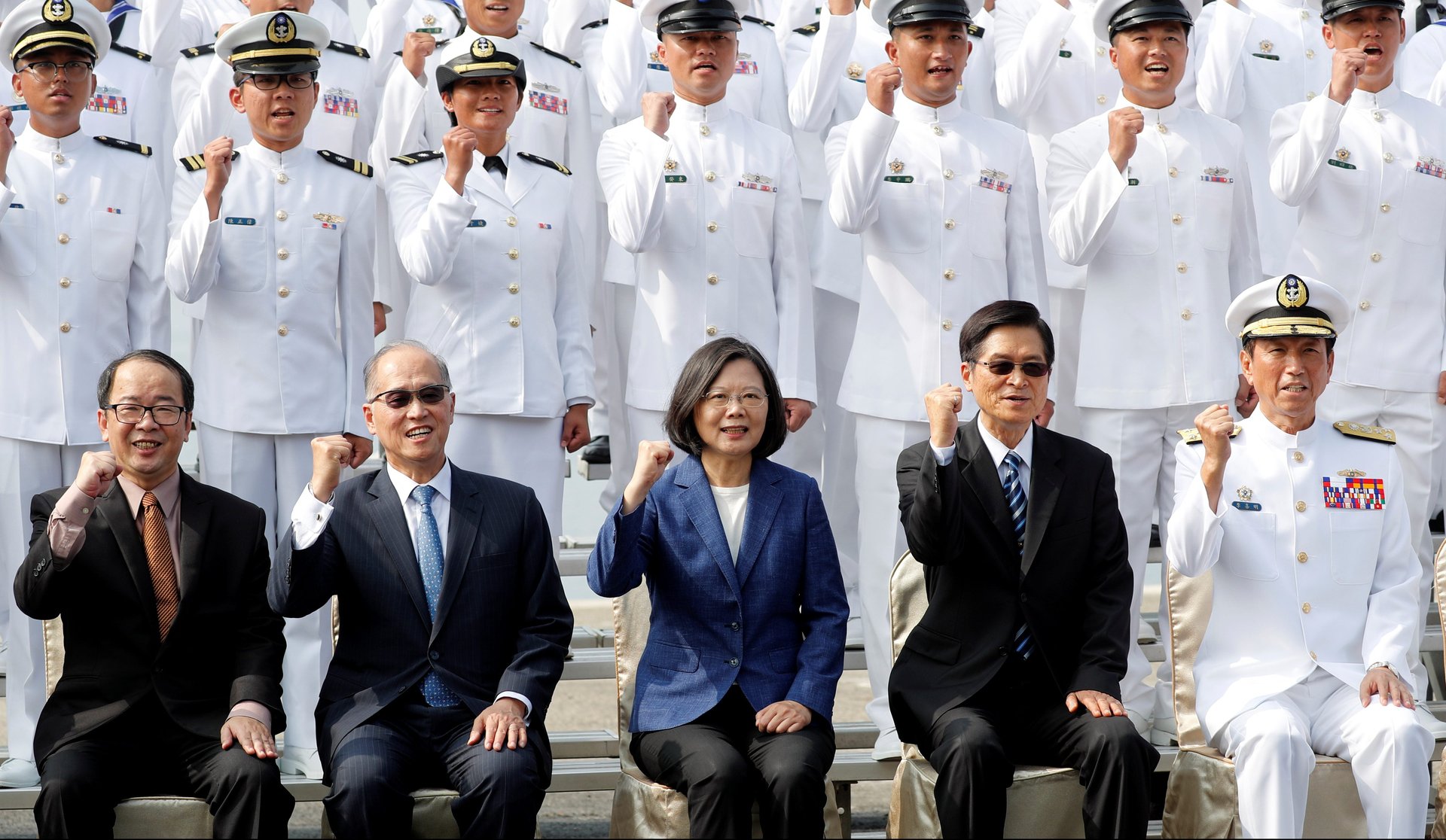Taiwan’s president is tired of getting trolled for being a childless, single woman
Taiwan’s president presides over a country of 23 million people, led her government to be the first in Asia to legalize same-sex marriage, and just recently won her party’s primary election to officially stand for re-election next year. But one thing hasn’t changed for her since she came to power, she says: relentless sexist attacks from her opponents.


Taiwan’s president presides over a country of 23 million people, led her government to be the first in Asia to legalize same-sex marriage, and just recently won her party’s primary election to officially stand for re-election next year. But one thing hasn’t changed for her since she came to power, she says: relentless sexist attacks from her opponents.
Those attacks reached a nadir this week when the presidential nominee from the New Party, a small party espousing unification with China, said that he objected (link in Chinese) to Tsai Ing-wen’s presidency on the grounds that she was both a woman and single. “She isn’t qualified to talk about the next generation, because she doesn’t have children of her own,” said Yang Shih-kuang, who is the director of his party’s youth arm.
Tsai responded on a Facebook post on July 2 with the following comments:
Since I entered politics, these sorts of personal attacks against me have never stopped. Many Taiwanese women also frequently experience this sort of treatment.
In the past three years since I came to office, we’ve increased basic salaries, reduced taxes for families, widened subsidies for child care, build social housing, and promoted elderly care policies. All of these policies are for the next generation, and to reduce the burden on young parents.
Perhaps we haven’t done enough or performed sufficiently, and I’m willing to accept criticisms and continue working hard. But launching personal attacks on the basis of gender or fertility status is an act that negates women and undermines the efforts of the government.
Many young parents in Taiwan are working hard for the next generation, but there are also people who haven’t married and had kids. This doesn’t mean that they can’t empathize with the hardships of being a parent.
As Tsai said, since she was elected to power, sexist attacks against her have been continuous—Chinese state media famously called her (paywall) an emotionally unstable single woman shortly after her victory in 2016. But as Taiwan gears up for presidential elections in January those comments have intensified, and haven’t just come from fringe groups like the New Party. Presidential hopefuls from the main opposition party, the pro-Beijing Kuomintang, have delivered similar attacks against Tsai in recent weeks.
Han Kuo-yu, the populist mayor of Taiwan’s second city Kaohsiung who is hoping to be picked as the Kuomintang’s candidate, engaged in a war of words with Tsai in April over the status of Taiwan’s military, with Han suggesting (link in Chinese) that Tsai—who is also commander-in-chief of Taiwan’s armed forces—was unqualified to comment because she “hasn’t served in the military.” Taiwan has conscription for all able-bodied males.
In another incident the same month, Han’s Kuomintang rival Terry Gou—the billionaire founder of iPhone assembler Foxconn—said that “the harem should not meddle in politics” after he said his wife was opposed to him running for president. Gou had also said that he only decided to run for president after a revered sea goddess came to him in his dreams.
Tsai has even faced sexism from within her own camp. An elder in her Democratic Progressive Party (DPP), Koo Kwang-ming, threw his support behind Tsai’s male opponent in the primary, suggesting that the president should step aside for a male to succeed her, after which she can be seen as the “mother of the nation.”
The comments reflect a deep-seated misogyny in Taiwanese society that hasn’t dissipated with the election of its first-ever female president, and despite the fact that women were at the forefront of the country’s fight for democracy. These include DPP veterans such as former vice president Annette Lu, who was imprisoned in the 1980s for her activism and who wrote a feminist novel during her incarceration, and former Kaohsiung mayor Chen Chu who too was imprisoned. Both have been subject to sexist treatment by their party mates and opponents for years, with the Kuomintang’s chairman likening Chen (link in Chinese) to a “fat sow” last year.
As a recent piece in Taiwanese news site the News Lens put it (link in Chinese), in Taiwan’s misogynistic political universe, women can only be seen as “mothers, wives, grandmas, or goddesses.”